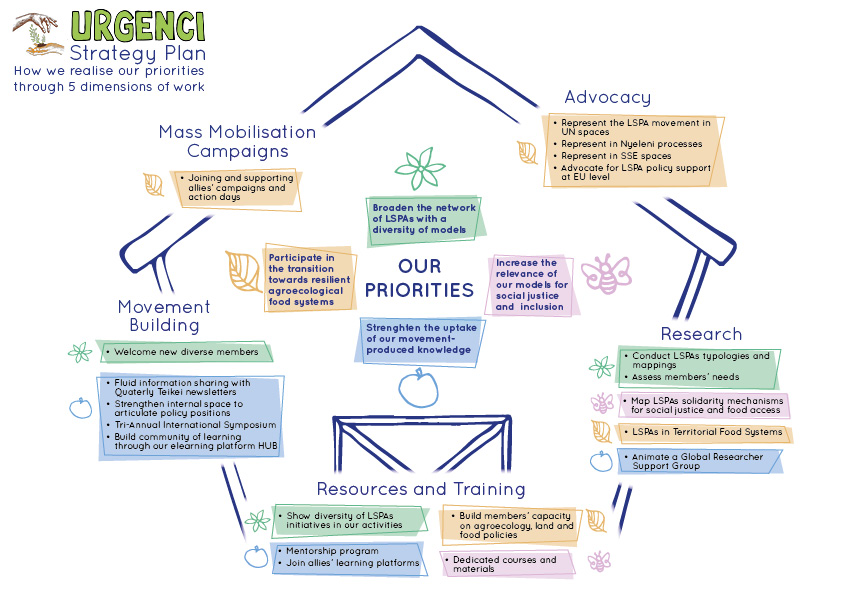What We Do
What are our main activities?
Our work as secretariat of an international grassroot movement entails
- Coordinating experience sharing and strengthening movement building, with actions such as:
- Showcasing successful stories from field; and
- Encouraging exchanges between Local, Solidarity -based Partnerships for Agroecology (LSPA).
- Providing decisive support to create nascent networks in different parts of the world, pooling of tools and experience;
- Strengthening the mobilisation of local producers’ and consumers’ networks;
- Creating alliances with other initiatives at local, regional, national, and international level; and
- Coordinating the actions at international level (and facilitating consistency).
- Providing research, resources and tools, with actions such as:
- Providing access to capacity building or other forms of trainings;
- Developing information and communication tools;
- Developing tools to reinforce the viability of the partnerships;
- Creating international financial and methodological tools to further LSPAs;
- Undertaking research to support the Member’s efforts; and
- Implementing other actions that help serve the objectives of the Network.
- Increasing visibility, with actions such as:
- Representing the LSPA movement at the United Nations (UN) level;
- Supporting and advocating for LSPA policy support at the various regional levels;
- Creating dialogue with public institutions; and
- Developing mass mobilisation campaigns.
What are our priorities?
We have evolved and matured as a movement, which enabled us to identify and refine our priorities

Broadening the LSPA movement. The concept of PLSA promoted by Urgenci responds to the expansion and diversification of models within the movement. The network can thus reflect, without limiting it, the creativity of actors in the field. Urgenci’s mission is to build a space for sharing, discussing and analyzing these practices. This priority is reflected in research aimed at understanding the diversity of solidarity partnership models within the framework of territorialized food systems, the entry and exit paths of the different models; the development of a range of training and resources on the diversity of models; as well as the inclusion and increased visibility of members who represent this diversity within the network.
Increase the relevance of our models for social justice and food access: supporting decent livelihoods for producers and social inclusion of consumers. This is an extension in our movement of the challenge to a fair and inclusive transition. This priority consists of research activities to identify, understand and validate the types of initiatives and partnerships that promote access to food for marginalized populations and groups; training and resources to disseminate know-how in this area and give groups and networks the tools to outreach beyond themselves.
Participate in the transition towards resilient agroecological food systems. Initiatives within our movement are recognized as part of the transition to the re-territorialization of food systems. Urgenci has an important role to play simultaneously at multiple levels, ranging from local food policies that support PLSAs to working in broader alliances and coalitions on social and environmental issues at regional and international level. This priority includes: research actions; developing training and resources, building alliances and taking part and representing the movement in international food policy-making spaces and processes.
Strengthen the uptake within the movement. Ensure the use of resources by network members. It is important to ensure that the knowledge and knowledge produced, which covers a wide range of themes are properly shared, understood and used. It is important to ensure that existing knowledge and knowledge produced are properly shared, understood, and meaningfully used. Too often project deliverables are shelved once a partnership has ended or do not end up properly used by those who were meant to benefit from them. URGENCI and its members have been developing an impressive breadth of technical knowledge to help the sustainability of LSPA initiatives. As a network of networks, many of our members are also engaged in developing learning activities and could benefit even more from one another. There is a need to foster connections between existing mentoring programmes and experiences.
